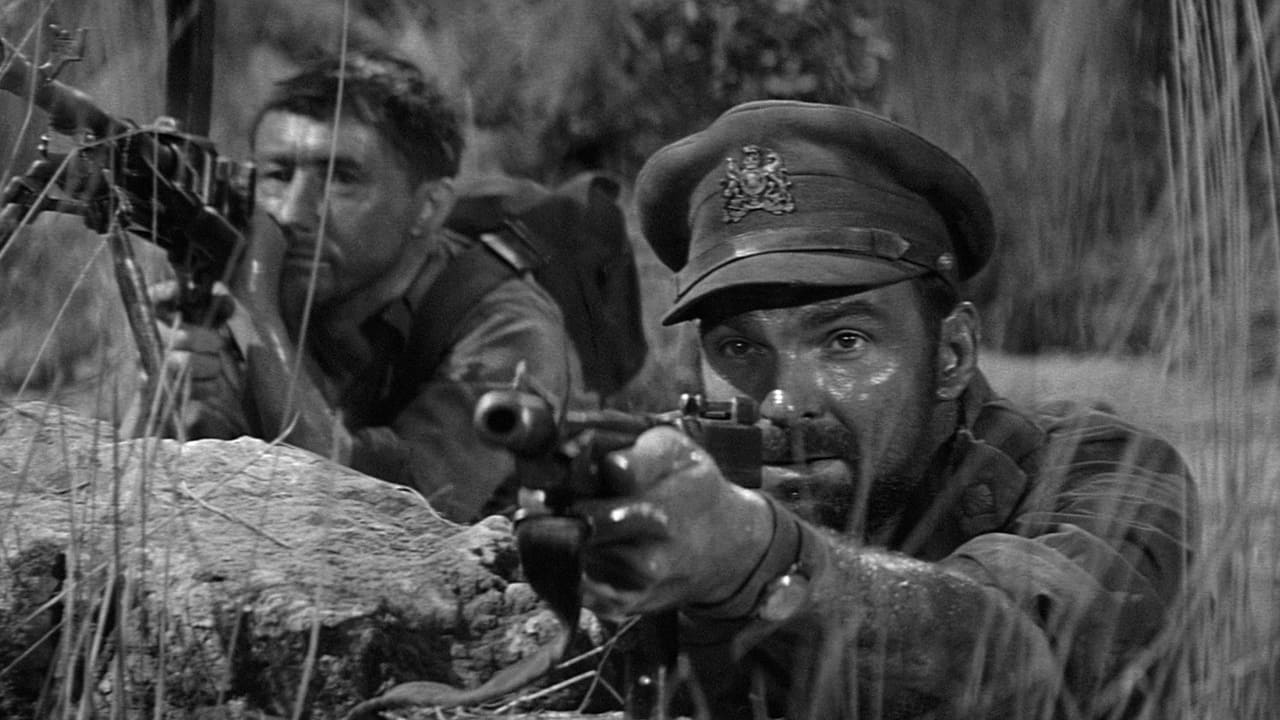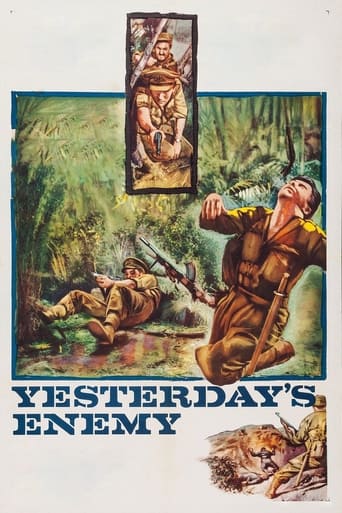

Copyright 1959 by Hammer Films. Released by Columbia Pictures. New York opening: 3 September 1959. U.S. release: November 1959. U.K. trade show: June 1959. Australian release: 27 November 1959. 95 minutes. Australian release length: 8,581 feet. 99 minutes.SYNOPSIS: Burma in World War 2. The remnants of a British brigade make their way through the jungle to a native village, occupied by the Japanese. After a brief skirmish, the enemy is routed and a native informer taken prisoner. When the man refuses to talk, the brigade's commanding officer (Stanley Baker) orders two innocent Burmese natives shot down in cold blood.COMMENT: "Yesterday's Enemy" starts off in a deceptively familiar fashion, lulling the audience into the belief that we are in for yet another routine war-time jungle patrol film. Certainly, all the customary ingredients are here and the script often takes time out for the customary platitudes and philosophical questionings. But where "Yesterday's Enemy" differs from its colleagues is in its violence and ruthlessness, its sense of futility and hopelessness, abetted by realistic playing (admittedly, Guy Rolfe and Leo McKern are none too convincing, but the others, particularly Baker, Jackson and Ahn, are excellent), atmospheric sets and photography (hard to believe the film was lensed entirely in the studio) and Guest's occasionally inventive direction.
... View MoreOn the surface this is just another war film set in the Far East involving the Occidental fighting the Oriental . The fact that it was produced by Hammer Films probably isn't a great omen either but before watching I came on to the trivia of this site to find to Stanley Baker regarded it as one of his best films . It also has the distinction of being written by Peter R Newman who wrote the 1964 DOCTOR WHO story The Sensorites who also wrote YESTERDAY'S ENEMY originally as a television play for the BBC . This film , the teleplay and his contribution for DOCTOR WHO are his only writing credits . He gave up his career as a writer and worked as a hotel porter till his death in an accident in 1975 This is a slightly different take on the war is hell theme . Baker plays Captain Langford who is leading a patrol of men cut off behind Japanese lines in the Burmese jungle . What becomes very clear long before the halfway point in the movie is that things aren't going to work out nicely for Langford's section . This is a bit more than simple heroic brave white soldiers overcoming the Japs and surviving towards a happy ending What sets it apart from its peers in the 1950s war genre is how it blurs the lines between good and bad . Of course since 1959 when this film was released we have seen a glut of films such as APOCALYPSE NOW and PLATOON where the morality of carrying out certain acts in war are heavily questioned as being for the greater good but this would be a relatively new concept in the war genre . What's the difference between native villagers being shot by the British or the Japanese ? Is there one ? What's the difference between killing civilians being shot by soldiers on the ground or by pilots up the sky ? Is there one ? It's left to the audience to answer these questions in their own minds Where the film falls down slightly is when Langford and his surviving men become prisoners of the Japanese . It's a little bit too convenient and obvious that the events seen in the latter half of the film perfectly mirror those seen in the earlier half and where the tables are now turned 360 degrees , not enough to ruin the film but the first half where Langford has to take practical steps which may or may not be war crimes in that era is probably better than the second half . As Baker pointed out at the time the lack of budget where it's obvious that it's filmed on a sound stage also gives the movie a slightly cheap feel One last point while watching this film in 2013 that needs pointing out is the background of the Second World War . What would be viewed as murder or breaking the rules of war today were somewhat more flexible back then . Rightly if Langford committed some of the acts in a village in Afghanistan today he would face a charge of murder but probably not so back in 1942 in a Burmese village . That said the whole point of the film wants to put the audience in the combat boots of Langford and this is does admirably
... View MoreYesterday's Enemy is a taut claustrophobic war film about a whittled down company of British soldiers caught behind the lines in Burma. It takes no sides other than to point out the absurd futility and dehumanization of individuals in war and the limited options they are faced with. It is a sober unromantic and highly provocative work that foreshadows the quagmire in Viet Nam and unapologetically addresses actions taken in the heat of battle far from the sideline moralizing out of harm's way. Captain Langford leads his lost patrol with a firm hand cajoling and threatening members of the unit to remain disciplined and vigilant. When they stumble upon an austere Burmese jungle village they are surprised by a fierce Japanese resistance attempting to protect a senior officer. With the village under control Langford seeks answers through intimidation, torture and finally execution of innocent locals. Eventually they are overwhelmed by the Japanese who adopt the same methods to get answers about their missing general.Despite it's sound stage jungle locale Yesterday's Enemy director Val Guest attains a very atmospheric feel of heat and pressure with the uncompromising downward thrust of the film as reality trumps morality. Stanley Baker's Langford and Gordon Jackson's Sgt. McKenzie remain stoically impressive throughout as they address the reality they are given while Guy Rolfe's Padre and Leo McKern's journalist Max ably bring balance and debate to the picture in arguing the other side.Yesterday's Enemy (even the title points out the absurdity of war) unromantic and dark vision offers no solutions but raises dozens of questions about the ugliness of war without flinching remaining with you long after the firing has ceased. It is Britain's Steel Helmet.
... View MoreI firmly believe that, if Val Guest had been born in the United States, his films would be better known and more widely celebrated than they currently are. His maverick career path and idiosyncratic style align him with American counterparts, like Nick Ray and Sam Fuller, who become darlings of the auteur-driven critics of the 1960s and 70s. (As it was, American critics typically did not take the British film industry very seriously, except for Hitchcock, Lean, and other directors who "went international," until American film directors like Martin Scorsese brought folks like Michael Powell to the critics' attention.) In particular, Guest's career path (journalist to writer to director), occasionally brutal stories, and downright weird directorial choices remind me a great deal of Fuller. I wouldn't be surprised to learn that Guest screened "Steel Helmet" before shooting "Yesterday's Enemy," for instance. Today, Guest is probably best known among aficionados of Hammer Studios, where Guest worked regularly from the mid-1950s until the early-1970s, or among lovers of such campy movies as "Casino Royale" and "Expresso Bongo.""Yesterday's Enemy" was made for Hammer and came in the middle of what I think was Guest's best years, 1955-63. Virtually every film he made during that period is excellent, and "Yesterday's Enemy" is one of the best. As other reviewers have pointed out, it's a tough World War II film set in Burma and (in a daring move for the time) without any musical soundtrack. Fans of British cinema are in for a treat because of a cast of familiar faces: Stanley Baker, Leo McKern, Guy Rolfe, etc. Baker is especially good as the single-minded officer who's willing to sacrifice ANYBODY'S life to achieve his objectives, but it's Guest's film all the way. Although most of the film was clearly shot inside a studio, Guest uses this to his advantage to capture the claustrophobia and disorientation of jungle fighting. There are also some wonderful long tracking-shots during the action sequences that are extremely impressive in wide-screen.One of the other reviewers has suggested that this film illustrates the brutality of the Japanese and justifies the use of the atomic bomb on them. I'm not going to comment on the vaguely racist implications of his review, but (s)he clearly misunderstood the movie. In fact, Guest takes pains to demonstrate just how much Baker and his Japanese counterpart have in common; their decisions mirror each other, and the Burmese woman explicitly equates the British and Japanese. In other words, "Yesterday's Enemy" is ultimately an anti-war film, not an anti-Japanese diatribe. Everyone is brutalized by war.The only negative thing I can say about this movie is the one gripe that I always have with Guest's dramatic films: the intensity of the interpersonal conflicts among his various characters. In a lot of his films, every single character seems to be going through his/her own existential crisis at the same time and lets off steam by verbally attacking everyone in sight, and this sometimes comes across as melodramatic. In "Yesterday's Enemy," for instance, it's hard to believe that this army unit is still capable of functioning if the officers are constantly at each other's throats. But this was clearly Guest's decision, so it's a minor quibble.
... View More